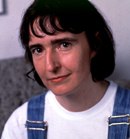Jonathan Hodgson, Aleksandra Korejwo and Bill Plympton, all commercial and independent directors, relate how they feel about the contrasts between directing commercials and their own independent works.
We asked three active commercial directors, who are also simultaneously making their own independent works, how they feel about the contrasts between directing commercials and independent films. Jonathan Hodgson, Aleksandra Korejwo and Bill Plympton all have different views on the relationship between directing these two forms of animation. Many independents find commercial directing a necessity in order to support their own work: is this a curse or a blessing? Jonathan Hodgson recently directed another award-winning independent film Feeling My Way. His most recent advertising campaign was a string of Bell Atlantic commercials. Aleksandra Korejwo is starting her latest independent work and just won "Best Commercial Film" at the Zagreb World Festival of Animated Film for her Campbell's Soup spot. Bill Plympton has directed commercials for 7-Eleven, AT&T, Air Touch Cellular, Taco Bell and many others. His feature film I Married A Strange Person is currently enjoying a limited U.S. theatrical release.

Jonathan Hodgson
While I find working in advertising can be exciting as a technical challenge, I have seldom worked on a campaign which was creatively or spiritually enriching. Most advertising re-hashes existing ideas rather than coming up with completely original concepts. This practice has often left me feeling artistically impoverished and really onlyvalued for my ability as a technician and diplomat. Having said this I have learned a lot about filmmaking and editing which I have been ableto utilize in my own work and, of course, the money one earns from advertising is useful in funding personal projects. However, I am reluctant to give back too much of my creativity to advertising. An artist's vision is a priceless and fragile commodity; a pure flowing spring which can easily dry up or be polluted. It should be cherished and nurtured, and not sold off to the highest bidder.

Aleksandra Korejwo
Before I started with commercials I had made several award-winning films involving classical music. When I met Ron Diamond for the first time at the International Animation Film Festival in Annecy, he said to me, "You have to know that making commercials is different from making your own films." Today I am very grateful to Ron Diamond at Acme Filmworks for carefully guiding me through the commercial world. My first commercial assignment was four animation films for the Austin Lyric Opera in Texas. I remember my first conference calls...It was a great experience for me to share my own vision, my own point of viewwith other creative people. It always reminds me of the discussions we had at the Academy of Fine Arts. I suddenly realized that commercials open my eyes to new ideas and horizons. For my own films I only have to look inside of myself. With commercials I need to understand the client's point of view. I need to listen, listen, listen! After this production Ron encouraged me to make my own film, Impression, which won several awards. The next commercial I made was for Campbell's Soup and it taught me to be very strict with myself. With commercials, I cannot change my ideas from the storyboard because once it is approved, the clients are trusting me to do exactly what I said I would do. It was the next lesson in being a commercial film director and animator.
Sometimes it is possible to make a commercial and be absolutely independent. This happened when I was making the title sequence for the Walt Disney Company's film The Wonderful Ice Cream Suit, with a screenplay by Ray Bradbury. Brilliant designer Bob Dawson, film director Stuart Gordon, and Roy Disney all gave me a lot of space. They believed that I would make this animation as best as I could, and I did. I think it is very important in commercials for the agency and client to trust the animator/film director. When I come back from the commercial animation world to my own animation, I am always more rich, my own vision is more clear and most importantly, my eyes are more open to other people's points of view. I have just started animation for both my own film and my next commercial. I think I can say that the structure of commercial-making and the freedom of doing independent films has become a kind of harmonious marriage in my artistic life.

In the end I would like to follow Ray Bradbury's philosophy from his book, Zen in the Art of Writing. He gives us three words with which to approach one's life: work, relax and don't think ("which results in greater creativity")! Lastly, his definition for work -- love what you do.
Bill Plympton
I look at commercials solely as a vehicle in which to finance my own feature films. I can't say that they help me learn or improve as they are often just carrying out exactly what the client wants and expects. Commercials limit you on creativity and often I am contacted due to my signature style -- that's what they want, that's what they get. I like doing commercials, don't get me wrong, but I naturally prefer my own feature work. Without commercials I couldn't do that, so they are a necessity, a good means to an end. Plus, it is fun when relatives and friends see my commercial work on television! Heather Kenyon is editor-in-chief of Animation World Magazine.







